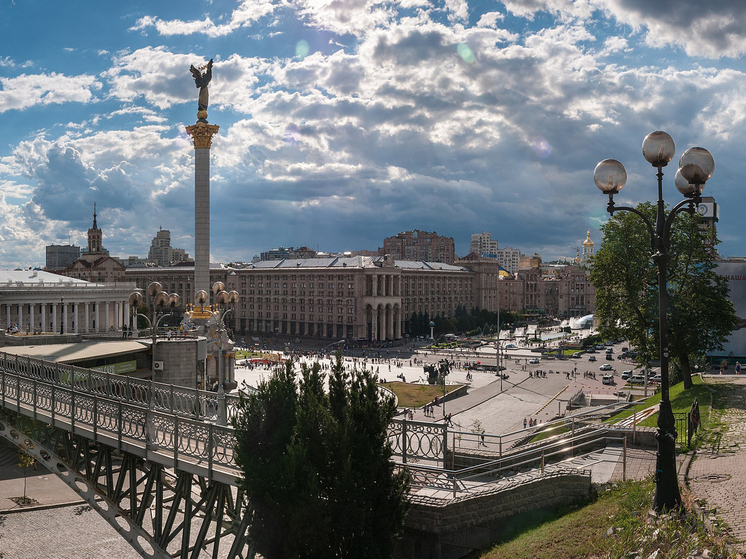Experts argue about when to expect it and what it will mean for Russia
The international rating agency Fitch believes that a process similar to default has begun in Ukraine. The long-term issuer rating (LED) of this country was downgraded by this structure from the level of «CC» (high probability of default) to «C» (default is inevitable). Information about this appeared on the Fitch website. How to understand such a harsh statement from a well-known Western structure and whether the negative scenario predicted for Kyiv will affect our country, MK found out from financiers.

Fitch, one of the world's top three rating agencies, expects that Ukraine will not service its external debt, including paying coupons on Eurobonds maturing in 2026, until a final agreement is reached with bondholders. When analyzing the situation, the agency was guided by the idea that in 2024, Ukraine's budget deficit will remain high and will amount to 17.1% of GDP, dependence on external financing will be increased, and the debt will increase to 92.5% of GDP excluding the current restructuring.
Let us recall that in August the deferment from Ukraine's payments to private bondholders ends, however, due to high military expenses, Kyiv is trying to reduce financial pressure and is negotiating with borrowers. In particular, on July 22, Prime Minister of Ukraine Denis Shmygal said that the country's authorities had reached an agreement on the restructuring of the state's external debt by $20 billion, which provides for the write-off of 37% of the debt.
“Downgrading the long-term issuer default rating of Ukraine in foreign currency reflects Fitch's view that the July 22 agreement in principle between the government and certain Eurobond holders on the terms of debt restructuring marks the beginning of a default-like process,” the agency notes on its website.
At the same time, Fitch believes that greater exchange rate flexibility, a robust policy package, and continued official support under the International Monetary Fund (IMF) program reduce risks to the country's macroeconomic and financial stability in the near term. Some experts even argue that even in the event of a default, Kyiv is not at risk of losing its funding entirely, because Ukraine receives funds through other channels. However, after the end of hostilities, the country will face problems in attracting foreign capital.
«Western analysts are right, but we are talking about a default within five years,» says independent financial expert Andrey Vernikov. «The problem is the change of elites in the West. The new elites are not bound by promises to Kiev, so the flow of Western aid will decrease.» Ukraine's economy has been collapsing for a long time. In fact, the country does not have an uninterrupted centralized power supply, so restarting many industries is problematic. There is also an acute shortage of personnel. It is highly questionable whether Ukraine will receive Russia's frozen reserves; rather, the West will take them for the weapons already delivered. «In fact, if there is a default, the West will receive even more land in Ukraine,» says Vernikov. «This is the most valuable.» Russia's benefit is not obvious. Unless the creditors put pressure on Kyiv to maintain gas traffic from Russia through the Ukrainian GTS in the coming years, which is beneficial for Moscow, the financier noted.
According to Alexander Razuvaev, a member of the Supervisory Board of the Guild of Financial Analysts and Risk Managers, Ukraine will default in August. Of course, this is not Russia's default in 1998, but things are already bad there, to such an extent that Ukrainians living inside the country may not even feel the changes. «Ukraine's only hope is to get our reserves from the West, but the West is unlikely to do this, because this is outright theft and everyone, including the allies and partners of the United States and the G7, will see it,» the analyst is sure. «In order to avoid default, we can also write off debts under the pretext that Ukraine is a victim of Russian aggression. But the West is unlikely to do this either, because the people in power there are pragmatic and know how to count their own money. A way out of the situation could be the transfer of territories to pay off the debts. We are talking about western lands: Lviv will go to Poland, a piece to the Hungarians, and the Romanians too. This scenario is not excluded, so we'll see.»
Default means the inability to service one's obligations. «In some cases, states can declare technical defaults, which does not mean a fundamental default,» reminds economist and BitRiver communications director Andrey Loboda. «In any case, such signals are negative. They indicate structural failures in fiscal and economic policy.» The write-off of part of Ukraine's external debt by international creditors can hardly be interpreted as a prerequisite for default, since this occurs within the framework of a dialogue and with the mediation of diplomats. Writing off 37% of Ukraine's external debt, on the contrary, makes servicing the rest of the debt more possible and timely.
In some cases, rating agencies make preventive decisions, since they look at the issue quite globally. But the West simply will not allow Ukraine to default — this is a serious reputational and economic moment in the confrontation with Russia. Well, for our country, a hypothetical default of Ukraine does not have any particular financial significance in the current conditions, Loboda is sure.

